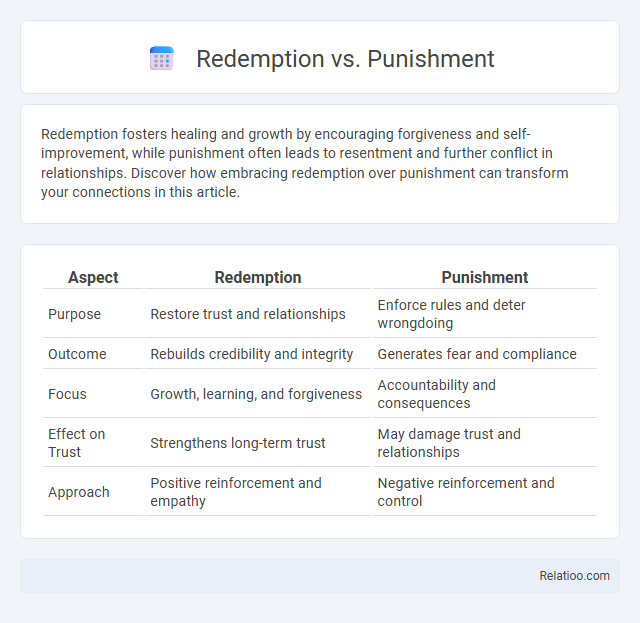Redemption fosters healing and growth by encouraging forgiveness and self-improvement, while punishment often leads to resentment and further conflict in relationships. Discover how embracing redemption over punishment can transform your connections in this article.
Table of Comparison
| Aspect | Redemption | Punishment |
|---|---|---|
| Purpose | Restore trust and relationships | Enforce rules and deter wrongdoing |
| Outcome | Rebuilds credibility and integrity | Generates fear and compliance |
| Focus | Growth, learning, and forgiveness | Accountability and consequences |
| Effect on Trust | Strengthens long-term trust | May damage trust and relationships |
| Approach | Positive reinforcement and empathy | Negative reinforcement and control |
Understanding Redemption and Punishment
Understanding redemption involves recognizing it as a transformative process where individuals seek to atone for their wrongdoings and restore moral integrity, often through sincere remorse and positive actions. Punishment, conversely, functions as a societal mechanism aimed at deterrence and retribution, emphasizing consequences for violations of laws or ethical standards. Exploring the dynamics between redemption and punishment reveals the balance between justice systems prioritizing rehabilitation versus those emphasizing penalty enforcement.
Historical Perspectives on Justice
Historical perspectives on justice reveal varying emphasis on redemption and punishment, with ancient societies often intertwining both concepts to maintain social order. In medieval Europe, punitive measures dominated, yet the idea of spiritual redemption through penitence influenced legal practices. Your understanding of justice's evolution highlights how societies balance retribution and rehabilitation to shape modern legal frameworks.
Key Differences Between Redemption and Punishment
Redemption involves transformative forgiveness that allows Your growth and positive change, whereas punishment focuses on penalizing wrongdoing to enforce consequences. Redemption aims to restore relationships and encourage moral improvement, while punishment seeks deterrence and retribution. The key difference lies in redemption fostering healing and second chances, contrasting with punishment's emphasis on accountability through penalties.
Philosophical Foundations of Both Approaches
Redemption centers on transformative justice, emphasizing moral growth and rehabilitation as core philosophical foundations, whereas punishment is rooted in retributive justice, focusing on proportional response to wrongdoing to uphold societal order. You encounter these approaches in ethical debates surrounding human behavior, where redemption seeks to restore dignity and promote change, while punishment aims to deter and exemplify consequences. Both frameworks reflect differing views on human nature, responsibility, and the ultimate goals of justice systems.
Psychological Impact on Offenders
Redemption offers psychological benefits by fostering hope and encouraging positive identity reconstruction, leading to reduced recidivism rates. Punishment often triggers negative emotions such as shame and anger, which can exacerbate antisocial behavior and hinder rehabilitation. Emphasizing redemption-focused approaches supports mental health improvements and promotes long-term behavioral change in offenders.
Societal Benefits of Redemption
Redemption fosters societal benefits by promoting rehabilitation and reducing recidivism, which helps create safer communities and lower incarceration costs. By offering individuals the chance to reintegrate productively, Your support for redemption-oriented justice strengthens social cohesion and economic stability. This approach contrasts with punishment alone, as it emphasizes healing and long-term positive outcomes over mere retribution.
Challenges of Punitive Justice Systems
Punitive justice systems often face challenges such as high recidivism rates, overcrowded prisons, and limited opportunities for rehabilitation, which hinder their effectiveness in reducing crime. You may encounter difficulties addressing the root causes of criminal behavior due to a predominantly punishment-focused approach, which often neglects social and psychological factors. Balancing accountability with opportunities for redemption is critical to creating a more equitable and sustainable justice system.
Case Studies: Redemption vs Punishment in Practice
Case studies on redemption versus punishment reveal that rehabilitation programs significantly reduce recidivism rates compared to traditional punitive measures. For example, Norway's correctional system emphasizes restorative justice, leading to one of the lowest reoffending rates globally. Your understanding of these models can guide informed decisions on criminal justice reform that prioritize long-term societal benefits.
Current Trends in Criminal Justice Reform
Current trends in criminal justice reform emphasize rehabilitation over traditional punishment, reflecting a shift toward restorative justice models that prioritize healing and reintegration. Policies increasingly support redemption by offering second chances through education, mental health services, and community-based programs aimed at reducing recidivism. Your role in advocating for these progressive approaches can help reshape the system to focus on redemption rather than mere retribution.
The Future of Justice: Toward a Balanced Approach
The future of justice emphasizes a balanced approach that integrates redemption and punishment to promote rehabilitation while ensuring accountability. Emerging legal frameworks highlight restorative practices alongside traditional punitive measures to reduce recidivism and support societal reintegration. Data-driven justice reforms prioritize tailored interventions that address individual circumstances, fostering long-term public safety and equitable outcomes.

Infographic: Redemption vs Punishment
 relatioo.com
relatioo.com